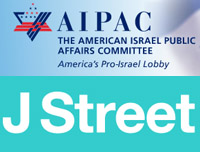
Logos courtesy of AIPAC and J Street
Yesterday morning, the House Foreign Affairs Committee approved the Iran Refined Petroleum Sanctions Act, a bill that would cripple Iran’s ability to import refined oil products. The timing, on the heels of a J Street conference of pro-peace religious and political leaders in Washington, was conspicuous. The move could be a veiled political kick in the ribs to J Street, a young lobbying upstart that has launched a clear challenge to AIPAC’s hegemony in Washington.
The fight between the groups grew more contentious earlier this month after prominent officials, including Israel’s ambassador to the US Michael Oren and New York Senators Charles Schumer and Kristen Gillibrand, withdrew their support for the J Street conference after initially saying they would attend.
Critics of the disputed bill worry that imposing sanctions before Obama pursues all diplomatic avenues could force the administration’s hand. In fact, as Robert Dreyfuss notes in his article on the evolving Israel lobby for our September/October issue, Foreign Affairs Committee Chairman Howard Berman stated in May that he had “no intention of moving this bill through the legislative process” before Obama completed his diplomatic overtures. But Berman reintroduced the legislation because diplomacy proved too slow for the California Democrat.
The National Iranian American Council, a group that aligns itself with J Street, has criticized the bill for undermining the president’s peace-seeking agenda. In an October 22 letter cosigned by 10 peace-advocacy organizations, NIAC urged Berman to reconsider the bill, as it “ties the President’s hands by giving him minimal discretion to refrain from imposing sweeping sanctions—even if Iran makes important concessions.”
“Now is a time when we need to be building up trust and this is a step in the wrong direction,” Patrick Disney, NIAC’s acting policy director, tells me, noting that Iran has already made concessions while negotiating with President Obama. “Mistrust is our biggest enemy, and if we believe that Iran isn’t negotiating in good faith, we won’t get anything out of this. The same is true if Iran doesn’t believe the United States is negotiating in good faith.”
There’s no doubt the sanctions bill will clear both chambers of Congress; three-quarters of the House and Senate were cosponsors, according to an AIPAC press release applauding its passage in committee. But Obama has been non-committal as to whether he will sign the bill when it reaches his desk. It’s shaping up to be ground zero in the next scuffle between the president and DC’s hard-line Israel lobby.













